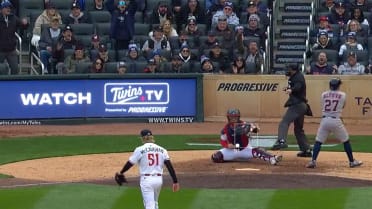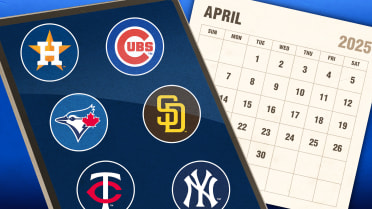The first taste of the big leagues for Astros pitcher Tyler Ivey was a short one, with him getting optioned back to Triple-A Sugar Land after throwing 4 2/3 innings in his Major League debut Friday night. The way he pounded the strike zone, though, left a lasting impression with the Astros.
Ivey, the Astros’ No. 9-ranked prospect, gave up four runs, six hits, one walk and struck out three batters in his start in the Astros’ 7-5 loss to the Rangers at Globe Life Field. He threw 55 of his 79 pitches for strikes and has emerged as an intriguing arm for Houston in the future.
“He came out throwing strikes, that’s what impressed us,” manager Dusty Baker said. “He had a good breaking ball, changeup. We thought he had enough at that time and that’s why we took him out. He handled himself very well. He wasn’t in awe of the crowd and didn’t appear too nervous, at least externally. He was probably nervous some internally, which he should be, but he did well.”
Ivey, 25, needed eight pitches to get three fly-ball outs in the first inning and followed that up with a 1-2-3 second inning, which he ended by punching out David Dahl for his first career strikeout. He gave up a solo homer to Brock Holt in the third and a two-run double in the fourth to Adolis García, who won the game in the 10th with a walk-off, three-run homer off Bryan Abreu.
“I thought he did a really nice job,” Astros catcher Jason Castro said. “Obviously, a Major League debut is really exciting, but doing it at home has to to be even more kind of nerve-provoking. He attacked the zone and put us in position to come back late like we did.”
Ivey threw his four-seam fastball for more than half (51 percent) of his pitches, with the slider (19 percent), curveball (16) and changeup (14) factoring prominently. His fastball velocity, which topped at 91.9 mph and averaged 90 mph, was slower than advertised.
“The ball felt good coming out,” Ivey said. “My stuff was a little down. The velo was down on all pitches. Just got to work on it. It will come back. That’s how it goes. I thought I was spotting up pretty well. I’m happy I was able to throw strikes and fill it up.”
Castro said Ivey’s unique delivery, which features a high leg kick, allows him to hide the ball, which means his pitches get on hitters quicker than the radar guns indicate.
“His spin characteristics make his velocity play a little bit harder than what it looks like on the board, when you see 90, 91,” Castro said. “The perceived velocity that you actually have to hit to get onto some of his pitches because of the high spin rate and the balls up in the zone make it play a little bit hard than that, and then he utilizes his offspeed mix after that. His numbers on the scoreboard don’t necessarily reflect the quality of his stuff.”
As far as nerves, there were some, but not too many. Ivey had known for days he was going to pitch and took a moment to walk around the mound early in the game and soak it all in.
“Big league hitters, I saw it tonight, they're different,” Ivey said. “Their bat-to-ball skills are unreal. Even if it’s a bad pitch, they still have a chance to hit it out of the ballpark. I thought it was a good learning experience for sure.”
Ivey, who grew up 30 miles away in Rowlett and cheered for the Rangers as a kid, had dozens of friends and family members -- maybe more -- cheering for him in the stands Friday. That included his parents, with his dad standing and giving an emphatic fist pump when he struck out Dahl in the second inning.
“It’s surreal,” Ivey said. “It’s an unbelievable experience to be out there close to home. I wish we got the win, but that’s OK. It’s baseball. It’s a tough game.”
Supervising Club Reporter Brian McTaggart has covered the Astros since 2004, and for MLB.com since 2009.




